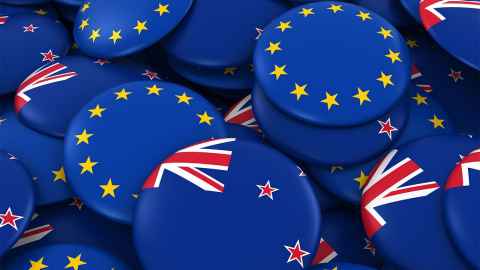NZ and the EU - life after Brexit
5 February 2020
Opinion: Now Brexit is done, NZ firms may be asking if it is worth remaining engaged with the EU. The answer is a resounding yes, writes Dr Peter Zámborský.

With Brexit officially approved and signed, New Zealand firms may ask themselves the same question as the Brits: is it worth remaining engaged with the European Union?
The answer is a resounding yes. While acknowledging drawbacks such as geographic and cultural distance, our research on New Zealand and Australian firms with research & development (R&D) and other innovative activities in Europe highlights the continued benefits of a deep engagement in the European market, in particular connections to world-class universities and talent that can improve innovation performance.
Europe is home to six out of the world’s 10 most innovative countries, according to the Bloomberg Innovation Index. And the EY European Attractiveness Survey 2019 reports that while the number of foreign direct investment projects in Europe dropped for the first time in six years in 2018 (4 percent down compared to 2017), R&D foreign direct investment (FDI) increased by 16 percent annually, underpinned by a 45 percent surge in digital R&D projects across Europe. About 44 percent of R&D FDI projects were initiated by firms in the digital sector in 2018. A longer-term view shows R&D FDI has doubled in 2013-2018 across Europe.
Our research analyses this trend with a focus on New Zealand and Australian investors. They are still a rare breed in Europe: Eurostat data showed there were around 100-150 New Zealand and Australian firms innovating in Europe compared to over 5000 American firms, about 750 Japanese firms and about 400-500 firms from emerging markets such as China, India and Brazil in the early 2010s. The innovation strategies of New Zealand and Australian firms in Europe were driven more by cooperation (in particular within the group) than strategies of firms from other countries, perhaps because of our isolation. New Zealand and Australian firms were also more prone to conduct R&D (not just general innovation that can include introduction of new processes and marketing methods).
Fonterra is one example of a New Zealand firm engaged in innovation collaboration in Europe. It partnered with a high-growth active nutrition start-up in Germany (the world’s most innovative country, according to Bloomberg) and has R&D activities in the Netherlands. Other NZX stock exchange firms also acquired innovative firms in Europe to diversify their R&D and product portfolio. Even firms that view Europe mostly as a destination for their products stress that their marketing staff in Europe also has a role to facilitate connections with local scientists and firms to boost innovation.
We found that New Zealand firms have somewhat more conservative attitudes to diversifying innovation in the EU compared to Australian firms, and both countries struggled to 'let go' and strategically diversify their innovation and R&D portfolios by encouraging radical innovation in their European subsidiaries.
Radical innovation often involves experimenting with new business models rather than just products or processes, and our and other related research finds that partnerships with geographically and cognitively distant partners increases the chances of radical innovation.
With completion of the European Union-New Zealand free trade agreement not too distant, it is perhaps time to reconsider the spate of bad news associated with Europe since the Global Financial Crisis. For companies that are seeking more than fast-growing markets for low value-added products, it may be strategic not to over-rely on Asia and diversify their innovation to include deep partnerships in Europe. Our research provides some guidelines along this path, including how to overcome communication bottlenecks due to geographic and cultural distance. The key lessons are to invest in building trust with European partners and facilitate knowledge flows and connectivity.
Dr Peter Zámborský is a senior lecturer in management and international business at the Business School.
This article reflects the opinion of the author and not necessarily the views of the University of Auckland.
Used with permission from Newsroom NZ and the EU - life after Brexit 4 February 2020.
Media queries
Alison Sims | Research Communications Editor
DDI 09 923 4953
Mob 021 249 0089
Email alison.sims@auckland.ac.nz